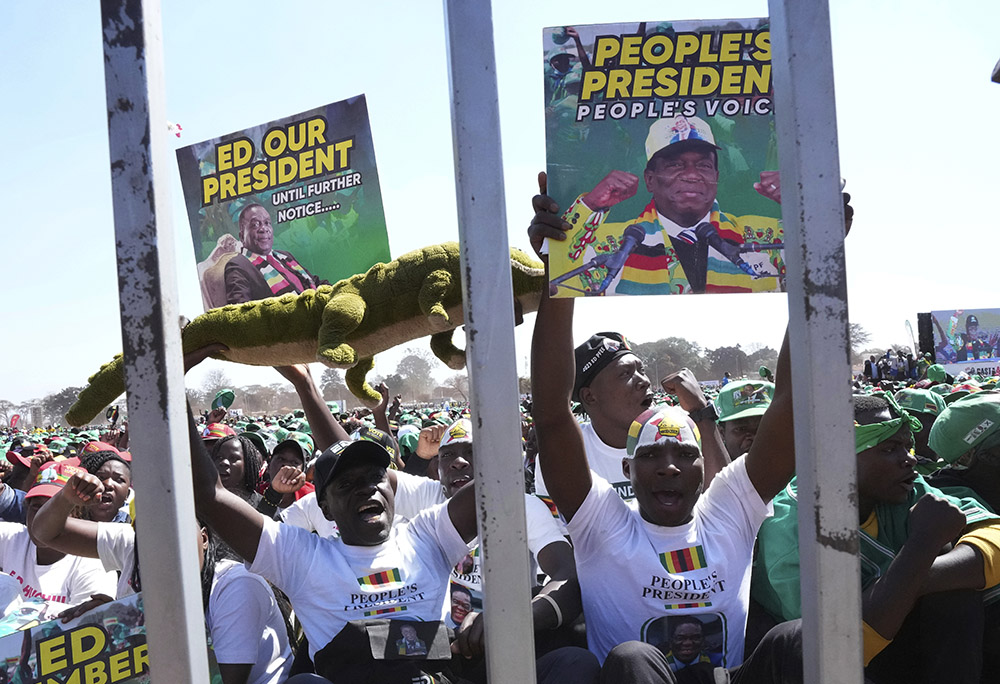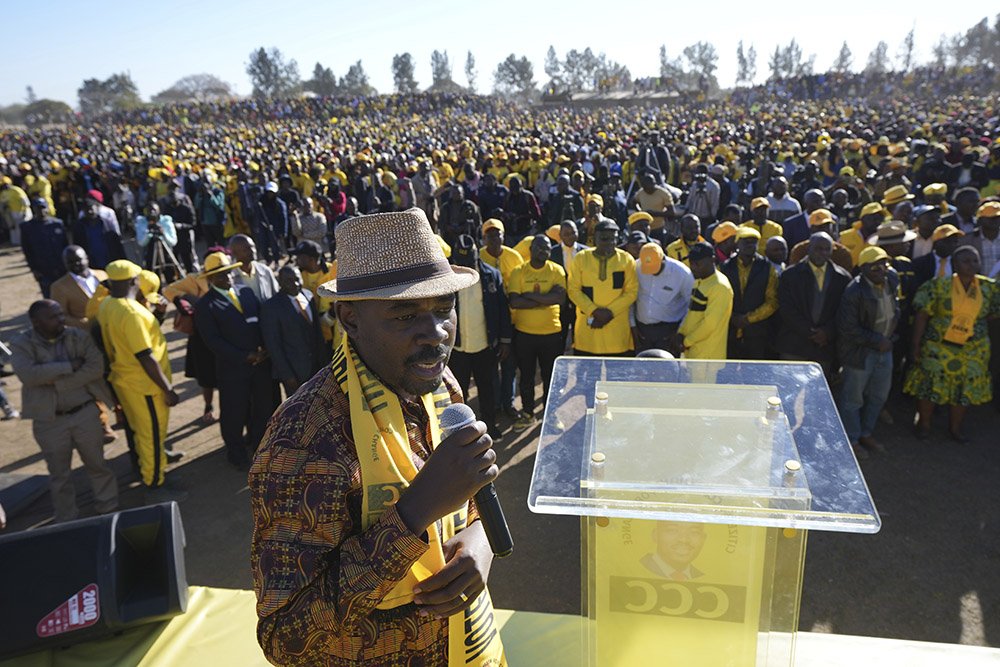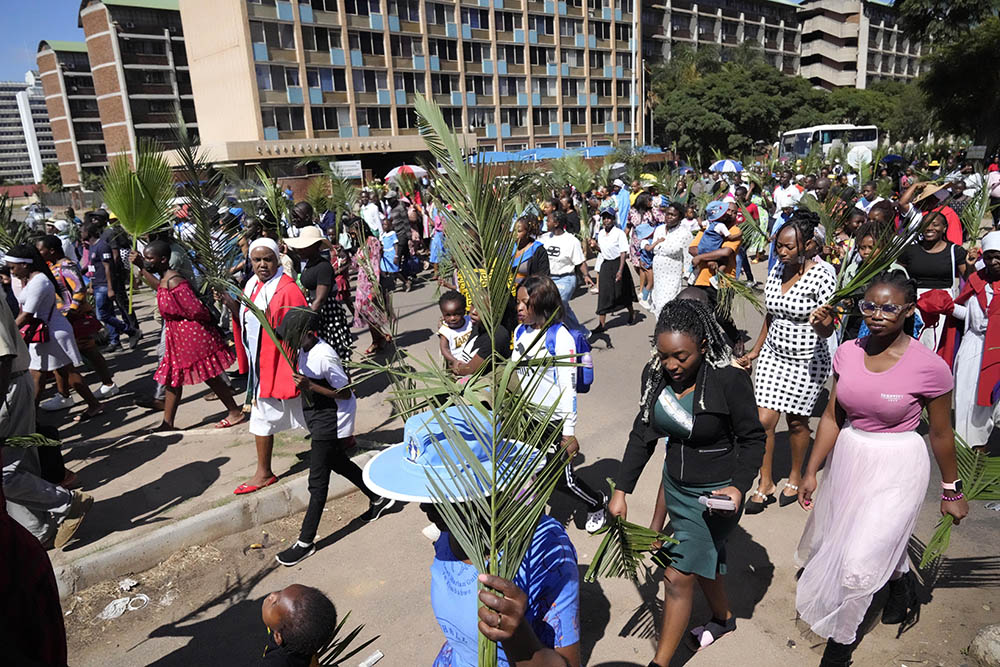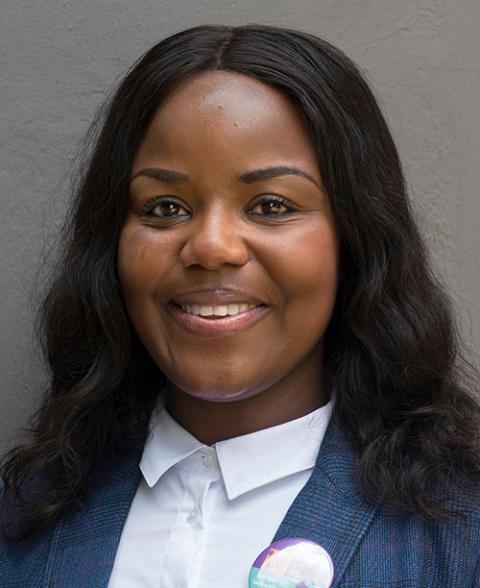
Supporters of Zimbabwean President Emmerson Mnangagwa are seen at a campaign rally in Harare Aug. 9. (AP/Tsvangirayi Mukwazhi)
Zimbabwe's Catholic bishops are taking a firm stand against any acts of political violence as the country prepares for a presidential election on Aug. 23.
President Emmerson Mnangagwa, who took over from former leader Robert Mugabe after a coup in 2017 and subsequently won election in 2018, is seeking reelection for a second and final term. His biggest opponents include the main opposition leader, Nelson Chamisa, and Saviour Kasukuwere, a former cabinet minister under Mugabe's administration. (Mugabe died in 2019.)
The Zimbabwe Catholic Commission for Peace and Justice's national coordinator, Paul Muchena, told NCR that Zimbabweans will go to the polls amid a "fragile economy" that has "continued to plummet." The value of the Zimbabwean currency has seesawed in recent months, leaving businesses unable to make plans for the future.
Muchena also said the country's political framework had not improved since the 2018 elections, which were hotly disputed.
After Mnangagwa was declared the winner in 2018, Chamisa accused him of having manipulated the outcome of the poll. However, Zimbabwe's constitutional court endorsed Mnangagwa's victory.

Zimbabwe's main opposition leader, Nelson Chamisa, addresses party supporters at a rally on the outskirts of Harare July 17. (AP/Tsvangirayi Mukwazhi)
"Zimbabwe's economy has been characterized by recurring droughts, lack of effective fiscal and monetary management, severe austerity measures, a volatile exchange rate, rampant corruption and public service shrinking incomes," Muchena said in an interview.
A recent poll survey by Afrobarometer however suggested Mnangagwa would finish the election race ahead of Chamisa, if elections were held in July. Nonetheless, the survey paints a grim picture of poor public confidence in the performance of the economy.
While Mnangagwa is drumming up support for a second term, Chamisa and Kasukuwere charge that the president and his administration have mismanaged the economy and neglected the welfare of vulnerable social groups.
Respect for the democratic process has also been shrinking, said Amnesty International Zimbabwe, which has criticized a new "Patriotic Bill" passed into law by Mnangagwa's administration ahead of the election. The legislation penalizes local individuals or entities for participating in meetings that result in trade embargoes and military interventions against Zimbabwe.
Participation in meetings that lead to the upset or overthrowing of a constitutionally elected government will also make offenders liable for jail.
Political analyst Pedzisai Ruhanya of the Zimbabwe Democracy Institute said fair state media coverage, free association and assembly and prevalence of a fair legal environment are the three major frameworks underpinning any credible election.
In an interview with NCR, Fadzayi Mahere, a spokesperson for Chamisa's party, the Citizens Coalition for Change, called for respect for political freedoms ahead of the election. The party has separately complained about allegedly being denied access to state media platforms.
Mahere called for the Zimbabwe Electoral Commission to make sure the list of eligible voters for the election be "independently audited" to prevent any possible vote manipulation.
The party is also calling on the Christian community and the Catholic Church in Zimbabwe to intervene and call for a fair electoral framework.
"The church has an important role to play in promoting social cohesion. The importance of speaking out against atrocities, human rights abuses and political violence cannot be overstated," said Mahere.
Legal groups such as the Zimbabwe Lawyers for Human Rights and the Law Society of Zimbabwe are worried about the resurgence of "brazen" and "arbitrary" use of violence against opposition-aligned rights defenders ahead of the election.
This came as two opposition-aligned lawyers have been brutally attacked in the past few weeks while security agencies have been clamping down on some of the opposition party rallies.
The Zimbabwe bishops' conference said in a pastoral letter this month that "elections have come and gone," and therefore Zimbabweans should not be coerced to carry out violent acts against those of differing political inclinations.
Advertisement
"Critical, defining and determining as these elections are, the contest for the highest office in the land, and other offices, should not divide us as a nation. ... Refuse to be used in violent attacks against your fellow brothers and sisters," the bishops said in their pastoral letter.
Zimbabwean elections have been mired in deadly violence before, during and after the elections, with the ruling Zanu PF party mainly accused of intimidating rivals through violence.
The 2023 election is coming against the backdrop of plummeting social and economic fortunes for Zimbabweans, with Catholic agencies having to step up aid and humanitarian interventions, especially in the work of climate change impacts on agricultural yields.
Fr. Tryvis Moyo, secretary general of the bishops' conference, said by email that Zimbabwe still needs to institute "reconciliation, peace building and justice" to address previous political upheavals.
However, it was difficult to address these "in an environment characterized by toxic politics that usually prevails around elections," he said.
"We have enjoyed some relative peace, though there have been worrisome incidents of violence. These are a cause of great concern and the church has also raised its voice in condemning violence," said Moyo.

Faithful commemorate Palm Sunday outside a Roman Catholic church in Harare, Zimbabwe, April 2. (AP/Tsvangirayi Mukwazhi)
Muchena said the bishops' Commission for Peace and Justice has been bringing together Zimbabwe's main political parties for peace campaigns and meetings.
"These activities are being implemented at two levels; at local levels ... diocesan commissions are engaging with electorate encouraging them to vote peacefully while also calling on political parties to conduct non-violent campaigns," said Muchena.
Apart from the bishops, other church groupings have also been criticizing "hate speech and derogatory language" across the political divide.
The Zimbabwe Council of Churches has criticized "involvement of children in political gatherings which compromises their safety."
Mnangagwa and his Zanu PF party say they have managed to grow Zimbabwe's agricultural produce and reduced the number of those who are food-insecure.
"As a country we are now food-secure but there are some pockets which did not get good harvests. Some foreign observer missions in the country are wishing that violence will dominate the elections," said Mnangagwa at a campaign rally in Zimbabwe's Mashonaland Central Province on July 23.









